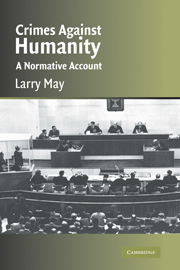Book contents
- Frontmatter
- Contents
- Acknowledgments
- A UNIVERSAL NORMS AND MORAL MINIMALISM
- B PRINCIPLES OF INTERNATIONAL CRIMINAL LAW
- C PROSECUTING INTERNATIONAL CRIMES
- 7 Prosecuting “Minor Players” for Crimes Against Humanity
- 8 Prosecuting State Leaders for Crimes Against Humanity
- 9 Prosecuting Genocide Amidst Widespread Complicity
- D DEFENSES AND ALTERNATIVES
- Conclusions
- Notes
- Bibliography
- Index
7 - Prosecuting “Minor Players” for Crimes Against Humanity
Published online by Cambridge University Press: 23 November 2009
- Frontmatter
- Contents
- Acknowledgments
- A UNIVERSAL NORMS AND MORAL MINIMALISM
- B PRINCIPLES OF INTERNATIONAL CRIMINAL LAW
- C PROSECUTING INTERNATIONAL CRIMES
- 7 Prosecuting “Minor Players” for Crimes Against Humanity
- 8 Prosecuting State Leaders for Crimes Against Humanity
- 9 Prosecuting Genocide Amidst Widespread Complicity
- D DEFENSES AND ALTERNATIVES
- Conclusions
- Notes
- Bibliography
- Index
Summary
Whom should international tribunals prosecute for crimes against humanity? In the case of ethnic cleansing in the Balkans, should it be the Serbian leaders who orchestrated the forced migrations in Bosnia and Kosovo? If “minor players” are prosecuted, what must the prosecution show in order to link these individuals to the larger ethnic cleansing campaign? The first people prosecuted at the Nuremberg Trials were the leaders of the Third Reich who had, among other things, planned and orchestrated the Holocaust. In contrast, because of the difficulty in capturing the leaders, the first people prosecuted by the International Criminal Tribunal for the Former Yugoslavia (ICTY) are the “minor players” rather than the leaders of the ethnic cleansing campaign. This chapter will address the conceptual justification of prosecuting these minor players. The next chapter will address the justification of prosecuting the leaders of States. In both chapters, we will seek a link between individual action and group action.
If the individual minor players are to be prosecuted by international criminal tribunals, what makes their acts crimes against humanity rather than merely crimes against a particular State? Is there a conceptually sound basis for prosecuting these individuals for having committed acts that are only loosely connected to the larger ethnic cleansing program? Following from the earlier chapters, the argument of this chapter takes an explicitly defendant-oriented approach. From this perspective, an element of a crime should not be rejected because it is hard for the prosecutor to prove.
- Type
- Chapter
- Information
- Crimes against HumanityA Normative Account, pp. 115 - 138Publisher: Cambridge University PressPrint publication year: 2004
- 1
- Cited by

